-
Leos Carax: HOLY MOTORS (2012)
LEOS CARAX: HOLY MOTORS (2012)
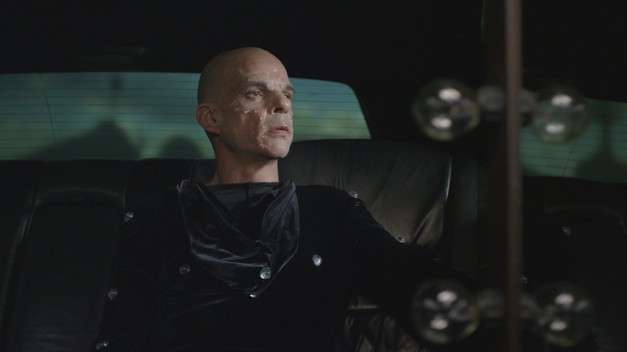
DENIS LAVANT IN HOLY MOTORS
Merde, etc.
Holy Motors is a phantasmagoric, eccentric and wonderful trip film that depicts the course of a single long day in the life of Monsieur Oscar (Denis Lavant), who travels around Paris by white stretch limo for a series of "appointments." He is a kind of actor who transforms into different characters each time, eleven in all. The interior of the limo is a dressing room, as elaborately equipped as young financier Eric Packer's nearly identical white limo in Cronenberg's (also one-day-spanning) Cosmopolis, (also shown first in competition at Cannes) and this film too ends with the limo drawing into a vast garage. Oscar is picked up from a mansion in the country by Céline (Édith Scob), his faithful chauffeur of the sad, elegant face, who calls his attention to the folders on his seat for each successive assignment. He begins the day disguised (only while in the back of the limo) as a wealthy banker ("Le banquier") -- perhaps who he "is"? His first "appointment" is as an aged crone ("La mendiante") who begs for change on a Paris bridge. We see him begin to put on his disguises, wigs, makeup, clothes. The next assignment (L'OS de Motion-Capture") is at a digital production studio where he dons motion laser-readable tights and does acrobatics.
This is followed by the most eccentric impersonation, an extraordinary troglodyte who or which steals a fashion model from Père Lachaise cemetery and takes her to his cave in the Paris sewers. This grows out of a 2008 short film Lavant and Carax did for the collection Tokyo!, is arguably the weirdest bit and was the starting point of the whole amazing film.
It's not clear (to me, anyway) whether the next "appointment" (le Père") even is one, or just life, it's so everyday-seeming and natural: Oscar gets himself up to look like an average dad and picks up his daughter from a party and drops her off at home. The next job, another rapid virtuoso display of changes ("Le tueur"), is a double assassination, and the one after that is a shooting on the sidewalk. Following this Carax goes into melodrama gear for a death scene influenced by Henry James' Portrait of a Lady. He's run through a panoply of genres by now, noir, actioner, meller, family drama, surreal fantasy, and there's musical romance and more to come -- a beautiful, touching sequence in the empty Samaritaine department store, with Australian singer Kylie Minogue, and a tragic ending.
I will not tell you about Oscar's last trip, to his "home" and "family" (" L'homme au foyer") except to say there has been a species change. I omitted one vibrant short sequence, after "Le Père," the Entr'acte/Interval/Intermission in which Oscar marches and sings and plays the accorion in a band ("L'accordéoniste "). But to fullly describe this film with all its allusions, its jokes, its surprises, its secrets, would take a volume.
And what are we to make of all this? The amusements of an insanely idle rich man? Multiple personality disorder, caused by some trauma? "The next evolution in entertainment," (as indicated in a conversation with a shadowy boss figure played by Michel Piccoli)? Or "a bizarre fantasy of movie-making" as suggested by the intro featuring a sleepy Carax himself crawling from bed into a crowded cinema, as Rob Nelson of Variety points out? Or -- why not simply "pure pleasure," as the Guardian's Peter Bradshaw decides? Anyway Holy Motors is extraordinary, a cinephile's delight (and a conventional movie-goer's annoyance or nightmare), and whether endlessly fascinating or just quite nutty, certainly a hilarious and audacious, authentically and deeply surreal, highly allusive and highly cinematic genre-busting original of a film. It's never quite defined what Monsieur Oscar's "work" means, but he seems to be blending acting with life, in a wildly more beautiful version of what goes on in Giorgos Lanthimos' relatively humorless and flat 2011 film Alps (SFIFF '12).
From Cannes, the AV Club correspondent Mike D'Angelo tweeted a, for him, astronomical score for Holy Motors of 88. His runners-up were Haneke's Amour (77) and Anderson's Moonrise Kingdom (75), followed by, further down the scale, Ursula Meier (Sister), Matteo Garrone (Reality) and Jacques Audiard (Rust and Bone). Next to Carax's 88 in D'Angelo's Tweet review was just a two-word comment, "Holy shit," which can be read as an expression of balls-out awe or a sly reference to the film's origins in the Tokyo! "Merde" episode, maybe both. Seeeing all those powerful films at Cannes in close proximity, D'Angelo rated Carax highest. It's a cinematic mindblower. D'Angelo correctly predicted that it wouldn't win a top prize (Haneke and Garrone got those), he thought because the jury just wasn't daring enough, but he was disregarding that some viewers really hate this film. He predicted it would be the film Cannes 2012 will be remembered for. It did win a prize at Cannes, the Prix de Jeunesse (awarded by a jury of 18 to 25-year-olds).
In the Q&A at the New York Film Festival press screening, Carax said his theme was the question "whether we still want to experience stuff, do action." He has also commented that stretch limos strike him as interesting anachronisms, out of date, depicting "the end of an era, the era of large, visible machines." Other themes are cinema, acting, life, transformation, the protean nature of existence -- and a homage to the protean abilities of Denis Lavant, whom Carax says he does not know, is not friends with, and has barely ever talked to in real life, but who is obviously a remarkable collaborator and essential to this film. These cryptic, intentionally unrevealing details actually reveal something: an intuitive and original filmmaker who has some deep thoughts about what acting and cinema do, though the film can be read as nothing but a series of eccentric riffs -- till you start thinking about it. Whether this is a masterpiece or a curio is worth mulling over. But it strikes me as I'd expected: as a standout title in the Main Slate of the 2012 New York Film Festival.
Holy Motors, 116 min., debuted at Cannes, opened in France July 4, where it received a galaxy of critical raves (Allociné 4.3) but a lukewarm Allociné spectator response (2.9) indicative that this adventurous watch is a hard box office sell. Screened for this review as part of the New York Film Festival at Lincoln Center. It opens in New York Oct. 17; US national release Nov. 9.
Last edited by Chris Knipp; 07-23-2014 at 11:44 PM.
-
Javier Rebollo: THE DEAD MAN AND BEING HAPPY (2012)
JAVIER REBOLLO: THE DEAD MAN AND BEING HAPPY (2012)
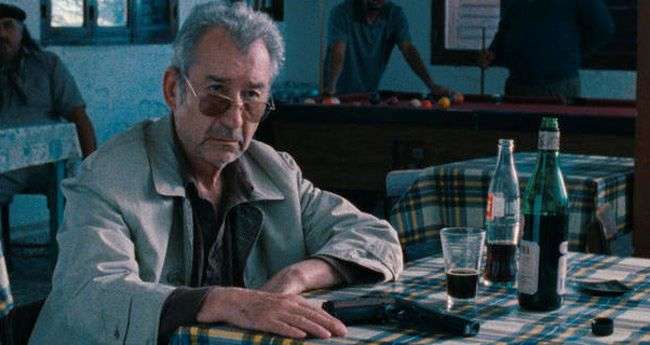
JOSÉ SACRISTÁN IN THE DEAD MAN AND BEING HAPPY
Touring back road Argentina with a dying hit man
For his third film Spanish director Javier Rebollo want to Argentina and logged 25,000 kilometers with his cast and crew making a road movie about a dying hit man and a 40-something woman estranged from her family, whom he picks up at a gas station. El muerto y ser feliz (the Spanish title) has qualities to recommend it to film festival audiences, such as a quirky plot-line, an inventive sound design, and vivid 16mm. film images, but Rebollo's movie winds up being flat and unmemorable. There are a lot of road movies, and this one's improvisational story hasn't much discernible shape. This isn't competition for, say, Carlos Sorín's charming little films set in Patagonia. Sorín knows the territory better and his humanism is clearer.
Rebollo starts out well with a scene of lively banter between his protagonist, Santos (Spanish veteran actor José Sacristán) and a young nurse (Valeria Alonso), sitting in a sunny park in a raincoat with his pajamas and slippers. Santos is a character out of Pablo Larraín: he probably worked for Perón, and then for the military, and now for the highest bidder. Now he is ridden with cancer, carrying three tumors, and his negotiation with the nurse is for a portable ice chest full of morphine vials. He's using money he's received for a last hit, which he has little intention of carrying out. As played by Sacristán, Santos has an aura of mystery and menace that is, however, neutralized by his dire condition. He's an interesting hcaracter, but he has nowhere to go, and hints of a beady-eyed man who hired the hit Jorge Jellinek, Federico Veiroj's A Useful Life), haunting him at various locations don't create any suspense. Nor does his relationship with Érika (Roxana Blanco), the woman he picks up, develop. They get close enough to sleep in the same room (but separate beds) and for her to give him his morphine injections, but there's not much emotion. A constant, often competition voiceover, by two different people, strives to make up for the lack of action on screen, and serves as a vehicle for Rebollo's aggressively intellectual style and ever-present irony, but can be annoying, particularly when it competes with and contradicts the loud dialogue simultaneously spoken by the actors. This contradition is the point, of course, but Rebollo's self-conscious cleverness may work for some but will be a turnoff for many.
Perhaps the ultimate interest of The Dead Man is the literal accuracy of the film's observations along its meandering path. Highlights include a ruined resort area a narrator calls “a strange mix of paradise and apocalypse” (which could go for the whole narrative) and the Cordoba resort town of La Cumbrecita (with its dwindling population of elderly Germans, clearly ex-Nazis, later followed by an extended visit to the desolate northern province of Santiago del Estero. Desolation, boredom, and a kind of zen peace blend, even though Santos is packing heat and threatens to use it, for something, such as to put a dog they've accidentally run over out of its misery. Dogs are a running theme in this offbeat travalogue. Derelict mutts are found at every gas station, and the head of Érika's family (Carlos Lecuona), whom they visit, a return to a fairly posh country home for her after a seven-year absence, is a dog breeder pledged to developing (with Nazi inspiration?) a unified master race of superior canines, while eliminating all the dogs with any defect.
The relationship between Santos and Érika could have become moving, and the trip does become more intense toward the end with the use of an ironic folksong about fables vs. realities composed by the director, but the tricks and ironies that were fun initially are, after so many miles, now threadbare and one would have preferred some stronger payoff than riding off into the sunset in an old Ford Falcon station wagon. The occasional switch of sound angle and cutoff of sound to silence are stylistic devices that are interesting artistically, but, like the dueling voiceovers, undercut the kind of gentle humanity that Sorín has drawn out of Argentina's desolate spaces.
Lola Mayo collaborated on the improvised script; she worked also on the director's 2006 What I Know About Lola, set in Paris. Salvador Roselli also collaborated. Roselli worked on the scripts o f those other Argentine road movies, Bombon El Perro (2004), Liverpool (2008) and Las Acacias (2011), with Carlos Sorín, LIsandro Alonso, and Pablo Giorgelli, respectiely. Santiago Racaj's 16mm. cinematography makes the most of the loales and the film's vibrant grainy look.
The Dead Man and Being Happy, 94min., debuted at San Sebastiaán, where José Sacristán won the Best Actor award. Rebollo's 2009 Madrid nocturne Woman Without Piano won him the Best Director prize at the same festival. The film is included in the Main Slate of the 50th New York Film Festival (Oct. 2012), where it was screened for this review. The rich sound design by Pelayo Gutiérrez and Dani Fontrodona was brilliantly if overbearingly on display in the Walter Reade Theater at Lincoln Center, which the director in a Q&A confirmed is an unbeatable venue. For sound and image, the Walter Reade, still ably managed by Glenn Raucher, is indeed peerless.
-
João Pedro Rodrigues, João Rui Guerra da Mata: THE LAST TIME I SAW MACAO (2012)
JOÃO PEDRO RODRIGUES, JOÃO GUERRA DA MATA: THE LAST TIME I SAW MACAO (2012)
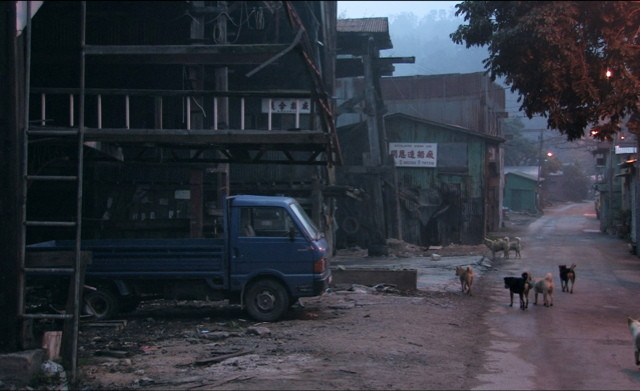 ]
]
Hokey plotline undermines doc footage
Lots of pretty (buit coldly digital) cinematography cannot compensate for the clumsiness of a tacked-on noir plot with hokey mystical overtones in The Last Time I Saw Macao, a documentary posing as a nostalgic film noir about a man who returns to the Chinese-controlled former Portuguese colony to see an old friend. We never see the main characters, and the plot about mysterious assassins never gains traction. Directors João Pedro Rodrigues (of the 2009 NYFF selection To Die LIke a Man) and his collaborator João Rui Guerra da Mata haven't gotten a grip on juicy material as they did in the award-winning earlier film. These 85 minutes feel interminable.
Calling this a "stunning amalgam of playful film noir and Chris Marker–like cine-essay" is typical empty festival blurb hype. Things feel wrong from the "spectacular" opening scene (unrelated to anything else) of the actress in which Cindy Scrash lip-synchs to Jane Russell’s “You Kill Me" from Josef von Sternberg’s 1952Macao with baby tigers cavorting in a fenced-off space behind her. The sequence is strangely lifeless -- and pointless. A silly sequence of a war game in which somebody is supposedly shot for real adds on more pointlessness, and gradually the "noir" story of the visit begins in voiceover, accompanied by conventional shots of Macao.
Images are mostly a travelogue to the old and new city, but there is too little chronicling of Macao's current status as the world's most intense gambling venue. Vegas-like signs abound, and one good image is a fake Venice lagoon with a Chinese gonadalier singing a Sinatra song in a mock-Sinatra voice. More of this kind of incongruity might have been interesting. The contrast between the old world charm of the Portuguese colony the narrator knew and the crass, hyperactive Chinese Macao is alluded to, and seems potentially fascinating material. But the observations of the place in the voiceover and by the camera are mostly at one remove, the kind of thing any sensitive tourist given to facile pronouncements could come up with. "Candy," the "friend" from decades ago, is evidently a transvestite (also the topic of To Die As a Man), gradually turns out to be much more than a friend. The interrupted attempts of the two to get together involving useless phone calls, are more tedious than suspenseful. Rodrigues' sometimes pleasingly lurid gay campiness (in other films) is far too muted here in this colorless effort. Chris Marker? Baloney!
Included, inexplicably, in the Main Slate of the New York Film Festival at Lincoln Center, where it was screened for this review, A últia vez que vi Macao debuted at Locarno.
Last edited by Chris Knipp; 07-23-2014 at 11:18 PM.
-
Pablo Larrain: NO (2012)
PABLO LARRAÍN: NO (2012)
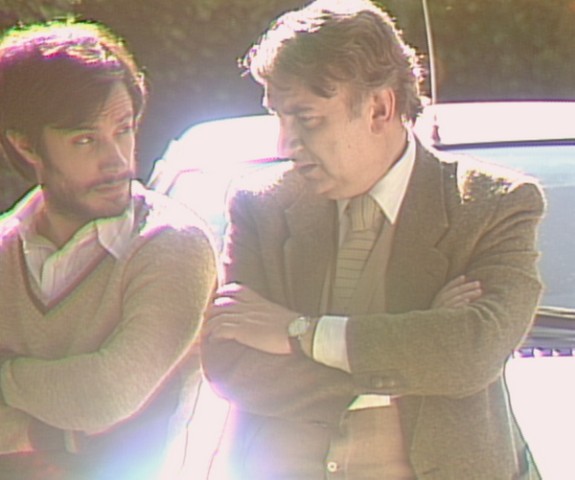
GAEL GARCÍA BERNAL, LUIS GNECCO IN NO
TV ads that mattered
No, by Chilean director Pablo Larraín (Tony Manero, NYFF 2008; Post Morten, NYFF 2010), is the richly imagined account of an ad campaign, one that happens to have a peculiar significance, because it led directly to voting down General Augusto Pinochet's fifteen-year dictatorship in a 1988 referendum. Many roles are resolved into a few in what is nonetheless a rich canvas headed by Gael García Bernal in one of his best performances in years. The only troubles are that the narrative meanders and that the outcome is, if you're aware of history, very obvious, and the screenplay cannot contrive to get around this. One also may feel Larraín has made a considerable sacrifice in abandoning the fabulously dark and sinister mood of his previous two features. But if this movie works with the American artthouse audience, it could push the director into the international mainstream in a way that his sublimely creepy two earlier films could not.
Those previous two films starred the great Alfredo Castro, first as a petty thief and murderer, then as a spineless coroner who has the job of recording the autopsy of the assassinated president Salvador Allende, Chile's elected leftist leader who was killed in a CIA-supported coup in 1973. In both cases Larraín approaches the Pinochet regime's devastatingly effect on the hearts and minds of the Chilean people in a way that is indirect but extraordinarily vivid. Tony Manero has the more lowly and despicable protagonist, a zombie-like fellow who lives to immitate John Travolta in Saturday Night Fever, but isn't very good at it, and is capable of killing an old woman just to steal her little TV. Post Mortem's focus is on death too, however, allowing for the development of its own slimy, sepulchral mood. Even the look of these two films is creeply. They have a sickly greenish tinge.
For No, Larraín adopts a brighter palette, though his decision to use virtually extinct Sony U-matic cassette video cameras from the early Seventies for the entire film stays with his preference for a distinctive, ugly look -- which in this case makes everything throughout harmonize with the advertising TV clips and archival footage from the period, as does the square Academy ratio of the film. This time instead of approaching the regime crabwise, he faces it head on. When young ace adman René Saavedra (García Bernal), reluctantly at first, takes on the campaign to promote the anti-Pinochet "No" vote in fifteen-minute late-night TV broadcasts, he is joined by members of the opposition. There are many parties and the film could get lost in leftist in-fighting, but from the start the focus is on advertising strategies. In the very first scene we watch Saavedra show an ad for a cola drink called "Free", and the businessmen balk because it's flashy and American-looking and has a mime in it. And this isn't just to create atmosphere. It's a hint of the same visual style Saavedra will want to use in his nightly anti-regime TV spots.
The first of many dark jokes is that Saavedra not only wants to ignore the dark side of the regime, but really doesn't care much about politics, though he may like impressing his estranged leftist wife Veronica (Antonia Zegers of Post Morten). Saavedra is the son of a dissident who was exiled when he was young after the Allende government was toppled (which might explain García Bernal's Mexican accent). But -- and this is the relevance of this movie to American politics -- what Saavedra cares about is snappy advertising style. He insists from the start that spots about the "disappeared ones" and torture -- the horrors of the dictatorship and the primary reasons for voting it out -- are too downbeat for adverts and should be replaced by zingy, upbeat imagers of happy people picnicking, rainbow flags, a tall man walking up a pathway, and so on, and happy jingles about freedom (like the cola). The second irony is that he's partly right. Pinochet represents hopelessness for the majority of the population and almost anything else represents light and positivity.
As No progresses the narrative gets a little chaotic and it's not always clear what we're seeing, but the substance of the film is nothing more than an inventive unreeling of the opposition "No" campaign TV spots, interspersed with scenes from Saavedra's life, meetings of government officials, and glimpses of the "Yes" adverts. There are moments when the "No" adverts seem absolutely ridiculous, others when they're actually moving. But we're continually aware that however crucial they might be, this medium is still all just flash and filigree. Saavedra's boss Lucho Guzmán (Larraín's previous star Alfredo Castro, looking this time only vaguely sinister) is a devious fellow who is actually running the pro-Pinochet "Yes" ad campaign -- covertly, pretending he's only a "consultant" for it -- while working with Saavedra on other non-political ads. Meanwhile he's threatening to "fuck up" the "No" crew good and vainly trying to bribe Saavedra off the "No" campaign by offering him a partnership in the firm. Saavedra refuses, but it seems for him more an ego trip than an act of idealism.
Behind Guzman's lures and threats there is a greater external menace, highlighted by the vulnerability of Saavedra's living with his innocent young mop-head son Simon (Pascal Montero), whose custody he shares with Veronica. There are cars following him and the other "No" campaign crew around and a vague suspicion that they may simply be wiped out or "disappeared." How can anybody believe that this will be a genuine election? It's assumed that Pinochet will insure his winning, but Veronica believes that the late-night "No" broadcasts will help awaken the public anyway. At the same time she tells Saavedra that his ads are just "a copy of a copy of a copy of a copy of a copy," and that in working on this campaign he's just playing the regime's game. Nothing is simple. All is ironic. And everything matters.
While Larraín's earlier films were small, cozy productions, this one is ambitious. The elaborate ads, involving large casts and multiple locaitons, are further augmented by the film's realistic crowd scenes of demonstrations and repression by riot police. The film's progression seems somewhat haphazard despite the obvious and strongly upbeat finale of the election, but this doesn't keep the proceedings from being compulsively watchable because of the sheer fascination of the rich material put together for the TV spots, the arguments about style and tone etc., and the deft minute-to-minute craft of editor Sergio Armstrong. García Bernal's understated performance (and the frequent presence of young Simon in key, scary moments) makes the film feel intimate despite the collective focus; the cast is all good. "Mad Men," with its preference for soap opera plotting to actual detail about advertising work, was never like this. Larraín has made a movie where propaganda content actually matters in all its specific detail, and it couldn't be more relevant to a time of Middle East revolutions and European and American elections in which regimes could rapidly fall. The film, incidentally, uses archival footage of Pinochet himself at numerous points; no actor plays the dictator. This time the writing is not by Larraín but Pedro Peirano.
No, 116min., debuted in Cannes' Directors' Fortnight, also shown at Locarno, San Sebastián, and Telluride. The official entry of Chile for Best Foreign Language Film at the 85th Academy Awards 2013. UK release Feb. 8, 2012, US Feb. 15, France Apr. 3. Screened for this review as a Main Slate selection of the New York Film Festival at Lincoln Center, Oct. 12, 2012. It definitely seems one of a handful of the most important films of the NYFF, and Pablo Larraín, with three distinctive films under his belt at only 36, clearly on his way to international importance as a director.
Last edited by Chris Knipp; 06-01-2020 at 10:06 PM.
-
Robert Zemeckis: FLIGHT (2012)
ROBERT ZEMECKIS: FLIGHT (2012)

DENZEL WASHINGTON IN FLIGHT
Days of wine and airlines
Robert Zemeckis' compulsively watchable new movie begins with a shocking notion: suppose you're on a passenger flight and the pilot is drunk? Then suppose the plane is flying in terrible weather, and develops irreparable mechanical problems? This is the situation screenwriter John Gatins (Hard Ball, Real Steel) takes on in Flight, which throws it all at you: mortal danger, heroism under pressure, moral confusion, the threat of jail time. The plane goes into a nose dive, but Captain Whip Whitaker (the formidable Denzel Washington) performs a bold set of maneuvers that saves the day. After the emergency landing the media present Whip as a hero. But a blood test shows he was legally drunk while piloting the plane. Flight starts out as a disaster movie and then pulls a switcheroo and turns into a character study of addiction and recovery. And the movie works because both parts are effective. Denzel's performance in the cockpit and the digitals of the crazy flight disaster and the chaos on board are as stunning as any in the genre. But when Whip wakes up in the hospital the movie turns compellingly to his confusion and ambivalence, which are suspenseful because of the scrutiny the disaster has brought upon him. There are no wrong moves here in Zemeckis' first return to regular live action directing in a decade. Here is a mainstream move that has both visceral excitement and emotional depth. The excellent supporting cast is headlined by Kelly Reilly, John Goodman, Don Cheadle, Bruce Greenwood and Melissa Leo. Gatins, who started on the script fifteen years ago, has still managed to keep it snappy, outlining things clearly and forcefully but not losing subtlety or turning maudlin or preachy. But there is a lesson here. Whip Whittiker may be the ultimate high-functioning alcoholic, but his accomplishment still leads to personal disaster. Maybe the screenplay is a little too wound up about its recovery topic -- it's hard for someone who's overcome addiction not to be -- but that's its only serious flaw.
The opening sequence, itself a shocker, shows Whip awakening after a glamorous night of debauchery with Trina (Nadine Velazquez), a fellow alcoholic, and a flight attendant who's working with him. The flight is early. It takes a couple lines of cocaine to get him up and ready. The snort of cocaine starts a jump cut to the plane, where Whip enters fully uniformed, looking commanding -- but we know the state he's in.
In the flight sequence, after several on flight vodka miniatures, Whip performs with breathtaking cool and skill, using tricks he learned flying in the Navy. There remains the question whether the whole disaster might have been avoided had he been fully in command of his senses. Given the terrible weather, he might have just cancelled the flight But this sequence dazzles, and is a neat structural device, because no matter how sullen and unappealing Whip seems thereafter -- and we well understand how his ex-wife (Garcelle Beauvais) and estranged son (Justin Martin) have no use for him -- we always remember he can be a hell of a pilot. And so we also understand how Charlie Anderson (Bruce Greenwood), his old Navy pal, now a pilots' union rep, would want to save him from the very serious charges he could incur for flying drunk in an accident with fatalities.
At the hospital he meets Nicole (Kelly Reilly), a heroin addict, masseuse, and would-be photographer whom he latches onto, thinking he can save her. She later has to save herself by losing him.
Whip hides from the media at his grandfather's Georgia farmhouse, where he pours out gallons of booze he had stashed there. The gesture is symbolic, because when he learns the charges he's up against, he abandons logic and is back bingeing. Nicole was in the hospital after OD-ing and resolves to stay clean, taking Whip to an AA meeting (which he quickly slips out of). She realizes she can't reclaim her life and live with him. He doesn't realize anything. The truth takes a while to sink in, and longer for him to tell to the world.
Denzel Washington is the man to put across the weakness-in-strength of this character, a man who is on a long-term downward spiral but capable of remarkable courage and skill under pressure.
John Goodman, in a rakish Dude performance as Whip's boon companion, enabler, and dealer, is cast as the Devil -- "Sympathy for..." by the Stones heralds his first appearance. In fact Don Cheadle, as the lawyer the pilots' union brings in to save Whip, is the Devil too. For an alcoholic, everyone is an enabler, and a Devil. The question is whether Whip will end his personal nosedive as he did the planes, or go down with these enablers' encouragement.
Flight moves toward a kind of courtroom climax, though it's technically only a hearing of a union board headed by Melissa Leo, whose questions lawyer Cheadle has set up Whip to dodge. But how this confused, conflicted, unsympathetic yet somehow charismatic figure will turn out is never clear till the last moments of the film -- which come a little late and are a bit preachy, but not enough so to spoil the strong earlier segments.
Flight , 138 mins., debuted as the closing night film of the New York Film Festival, where it was screened for this review on October 14, 2012. It will be released in the US Nov. 2, the UK Feb. 1, 2012, France Feb. 13. Metascore 76%.

DENZEL AT OCT. 14, 2012 NYFF PRESS 'FLIGHT' Q&A
Last edited by Chris Knipp; 06-01-2020 at 10:03 PM.
-
NYFF 2012 Main Slate: An Overview
NYFF, 2012. The Main Slate: an overview.
Comments and favorites.
(As a quick summary of my Filmleaf Festival Coverage, which includes a full review of each, here again is a list of the Main Slate films of the 50th New York Film Festival, with my brief critical comments in bold after each FSLC blurb. My top choices are highlighted in red.)
For the filmlinc.com source of this information click on the logo above or HERE. The blurbs are from the FSLC. Please note there were many wonderful sidebar items not covered here. See the Filmlinc website.
There are 33 Main Slate films, several more than some years. If you followed the Filmleaf Forum 2012 Cannes thread you'll recognize AMOUR, BEYOND THE HILLS, HOLY MOTORS, LIKE SOMEONE IN LOVE, NO, and YOU AIN'T SEEN NOTHING YET. I'd forgotten, but also at Cannes was Lafosse's OUR CHILDREN, and so was HERE AND THERE and Raul Ruiz's THE NIGHT ACROSS THE STREET. So that makes nine from Cannes, plus two from Venice and three from Locarno. LIFE OF PI and FLIGHT are opening and closing films that will not reward the film festival goer with anything not later to be in a local theater. This will be true of some others, including AMOUR, possibly HOLY MOTORS (both debuting theatrically at Film Forum in NYC, as I have mentioned). LIFE OF PI AND FLIGHT will have wide distribution. Films that have a US release coming outnumber those without release almost two to one.
Stills show some of the ladies.
Amour (Michael Haneke, Austria/France/Germany)
["Love."] Michael Haneke’s Palme d’Or winner of Cannes 2012 is a merciless and compassionate masterpiece about an elderly couple dealing with the ravages of old age. A Sony Pictures Classics release. [Cannes.] This was the most important, moving, and artistically elegant film of the festival.
Araf—Somewhere In Between (Yeşim Ustaoğlu, Turkey/France/Germany)
Director Yesim Ustaoglu depicts with empathy and uncompromising honesty the fate of a teenaged girl when she becomes sexually obsessed with a long-distance trucker and the promise of freedom that he embodies. [Venice.] A largely forgettable effort, too much like similar films, despite some nice visuals.

PETZOLD'S BARBARA
Barbara (Christian Petzold, Germany)
Christian Petzold’s perfectly calibrated Cold War thriller features the incomparable Nina Hoss as a physician planning to defect while exiled to a small town in East Germany. An Adopt Films release. [Berlinale.] A superbly made film, with Nina Hoss fine as usual, one of the festival's best.
Beyond the Hills/După dealuri (Cristian Mungiu, Romania)
4 Months, 3 Weeks and 2 Days director Cristian Mungiu returns with a harrowing, visually stunning drama set in a remote Romanian monastery. Winner, Best Actress and Best Screenplay, 2012 Cannes Film Festival. A Sundance Selects release. [Cannes.] A bit of a slog, but not as much as the usual new Romanian films, but a powerful and involving story, and in its way beautifully made.
Bwakaw (Jun Robles Lana, The Philippines)
A moving and funny surprise from the Philippines starring the great Eddie Garcia—and a truly unforgettable dog—in the story of an elderly loner going where he’s never dared venture before. Touching, fresh, memorable. A disappointing look to the visuals.

LVOVSKY'S CAMILLE REWINDS
Camille Rewinds/Camille Redouble (Noémie Lvovsky, France)
Noemie Lvovsky directs and stars in an ebullient comedy of remarriage that gives Francis Ford Coppola’s Peggy Sue Got Married a sophisticated, personal, and decidedly French twist. [French release September 12, 2012.] I enjoyed this free-flowing and relaxed lark; maybe not top grade festival material though.
Caesar Must Die/Cesare deve morire (Paolo Taviani, Vittorio Taviani, Italy)
Convicted felons stage a production of Julius Caesar in this surprising new triumph for the Taviani Brothers, winner of the Golden Bear at this year’s Berlin Film Festival. An Adopt Films release. [Berlinale.] Very involving, but marred by fudging of the facts, 'documentary' scenes obviously rehearsed.
The Dead Man and Being Happy/El muerto y ser feliz (Javier Rebollo, Spain/Argentina)
A dying hitman and a mysterious femme fatale set off on an oddball journey through Argentina’s interior in this playful and unexpectedly moving reverie on love, death and the open road. [San Sebastián Festival.] Made up as he went along and it shows. Interesting sound design, maybe too interesting.
Fill the Void/Lemale et ha'chalal (Rama Burshtein, Israel)
With her first dramatic feature, writer-director Rama Burshtein has made a compelling, disconcerting view of Israel's orthodox Hassidic community from the inside. Seems like an advertisement for ultra-Orthodox Judaism, and I'm not buying.
First Cousin Once Removed (Alan Berliner, USA)
Alan Berliner creates a compelling, heartfelt chronicle of poet and translator Edwin Honig’s loss of memory, language and his past due to the onslaught of Alzheimer’s. An HBO Documentary Films release. World Premiere. Relentless but a good record, and not your average Alzheimer's patient, to put it mildly. This guy is smart.
Flight (Robert Zemeckis, USA)
Denzel Washington and Robert Zemeckis team on this tense dramatic thriller about an airline pilot who pulls off a miraculous crash landing...while flying under the influence. A Paramount Pictures release. Closing Night. World Premiere. Very mainstream, a fest ticket-seller. Involving though. And people say Denzel just plays himself all the time. Not fair at all. This is the complex protagonist that the over-hyped ARGO doesn't give us.
Frances Ha (Noah Baumbach, USA)
Lightning-in-a-bottle, Noah Baumbach’s love poem to his star and screenwriter Greta Gerwig recalls Godard’s early celebrations of Anna Karina, but, as a New York movie, it’s beautiful in a brand new way. [Debuted at Toronto.] Yeah, this is high class Mumblecore alright and I liked it but the reaction is very mixed and I am tending to forget it.
The Gatekeepers/Shomerei Ha’saf (Dror Moreh, Israel/France/Germany/Belgium)
Six former heads of Israel’s internal security agency, the Shin Bet, discuss their nation’s past, present and future, in what will surely be one of the most hotly discussed films of the year. A Sony Pictures Classics release. [Documentary. Debuted at Jerusalem Festival.] Another good, searching Israeli doc like The Law in These Parts (SFIFF), great if you're into talking heads and archival footage.

GINGER AND ROSA
Ginger and Rosa (Sally Potter, UK)
Sally Potter’s riveting coming-of-age story, set in London in 1962, centers on two teenage best friends (played by the revelatory Elle Fanning and talented newcomer Alice Englert) who are driven apart by a scandalous betrayal. [Will debut at Toronto. UK release October 19, 2012.] Very Seventies self-indulgent lady filmmaking. One-dimensional; no context.
Here and There/Aquí y Allá (Antonio Méndez Esparza, Spain/US/Mexico)
After years in the U.S., Pedro returns home to his family in Mexico, but the lure of the north remains as strong as ever. A most impressive feature debut by Antonio Mendez Esparza. [Cannes.] Dull and flat. All that was glorious about neo-realism has been lost.
Holy Motors (Léos Carax, France)
Leos Carax’s unclassifiable, breathtaking, expansive movie—his first in 13 years—stars the great Denis Lavant as a man named Oscar who inhabits 11 different identities over a single day in Paris. An Indomina Releasing release. [Cannes.] A wild affirmation of how bold movies can be. No.. 2 of the fest after Amour.
Hyde Park on Hudson (Roger Michell, USA/UK)
Bill Murray caps his career with a wily turn as FDR in this captivating comedy-drama about the President’s relationship with his cousin Margaret “Daisy” Suckley (Laura Linney). A Focus Features release. [Debut at Toronto. US theatrical release from December 7, 2012; UK, FEb. 1, 2012.] Harmless but annoying tripe, great stuff for the cottonhead arthouse oldie aud, another fest ficket-seller.
Kinshasa Kids (Marc-Henri Wajnberg, Belgium/France)
Perhaps the most ebullient “musical” you’ll see this year, Marc-Henri Wajnberg’s singular documentary/fiction hybrid follows a group of street children in the Congolese capital. [Venice Days series.] Well, this is a good topic, and a less sloppy filmmaker might have made something great out of it.

THE LAST TIME I SAW MACAO
The Last Time I Saw Macao/A Última Vez Que Vi Macau (João Pedro Rodrigues)
This stunning amalgam of film noir and Chris Marker cine-essay poetically explores the psychic pull of the titular former Portuguese colony. [A cross between documentary and fiction. Locarno Festival.] A laudable but embarassing effort to jazz up a conventional travelogue.
Leviathan (Lucien Castaing-Taylor, Véréna Paravel, USA)
NYFF alumni Lucien Castaing-Taylor (Sweetgrass) and Véréna Paravel (Foreign Parts) team for another singular anthropological excavation, this time set inside the commercial fishing industry. [Locarno.] Very bold abstract doc, more a harsh visual poem than instruction about anything. But the in-your-face picture of large-scale US fishing is there.
Life of Pi (Ang Lee, USA)
Ang Lee's superb 3D adaptation of the great [Yann Martel 2001] bestseller resembles no other film. A 20th Century Fox release. Opening Night. World Premiere. Another fest ticket-seller, but a visual delight and a technical marvel. The ugly stuff of the novel's sea ordeal drops out, but this remains a nice memory.

LIKE SOMEONE IN LOVE
Like Someone in Love (Abbas Kiarostami, Japan/Iran/France)
Master Iranian filmmaker Abbas Kiarostmi ventures to Japan for this mysterious beautiful romantic drama about the brief encounter between an elderly professor and a young student. A Sundance Selects release. [Cannes.] A real puzzler. Fascinating, and finely crafted. But then you think, so what?
Lines of Wellington/Linhas de Wellington (Valeria Sarmiento, France/Portugal)
Passionate romance, brutal treachery, and selfless nobility are set against the background of Napoleon’s 1810 invasion of Portugal in Valeria Sarmiento’s intimate epic. [Debuts at Toronto.] A bumbling and amorphous continuation of husband Raul Ruiz's work, valuable bit of film history I guess, but not a success.
Memories Look at Me/Ji Yi Wang Zhe Wo (Song Fang, China)
Song Fang’s remarkable first feature, in which she travels from Beijing to Nanjing for a visit with her family, perfectly captures the rhythms of brief sojourns home. [Locarno.] A big bore. Again neo-realism is turning over in its grave. Reduced fundamental issues of parenting and aging to chit-chat.
Night Across the Street/La Noche de enfrente (Raul Ruiz, Chile/France)
A final masterpiece from one of the cinema’s most magical artists, this chronicle of the final months of one Don Celso allows the late Raul Ruiz the chance to explore the thin line between fact and fiction, the living and the dead. A Cinema Guild release. [Cannes.] Fascinating, complex, stuff you may be puzzled by but will enjoy talking about.
No (Pablo Larraín, Chile/USA)
Gael Garcia Bernal stars as a Chilean adman trying to organize a campaign to unseat Pinochet in Pablo Larrain’s smart, engrossing political thriller. A Sony Pictures Classics release. [Cannes.] Different direction for Larraín, and a bit shapeless, nonetheless darkly hilarious and significant; one of the best of the fest, maybe no. 3.
Not Fade Away (David Chase, USA)
The debut feature from The Sopranos creator David Chase is a wise, tender and richly atmospheric portrait of a group of friends trying to start a rock band in 1960s suburban New Jersey. A Paramount Vantage release. Centerpiece. World premiere. We all like rock and roll, but does anything make this special?
Our Children/À perdre la raison (Joachim Lafosse, Belgium)
Belgian director Joachim LaFosse turns a lurid European news story about a mad housewife into a classical tragedy. Émilie Dequenne more than fulfills the promise of her award-winning performance in [the Dardennes'] Rosetta. [Cannes.] Lafosse is good at messed-up, inappropriate family situations. Not very tightly edited.

RACHEL MCADAMS AND NOOMI RAPACE IN PASSION
The Paperboy (Lee Daniels USA)
Nicole Kidman gives one of her best performances in this steamy southern gothic directed by Lee Daniels (Precious) and co-starring Zac Efron and Matthew McConaughey. A Millennium Entertainment release. Parta of a Gala Tribute to Nicole. Lurid fun, if you like Zac in skivvies and Nicole with her legs spread. I do.
Passion (Brian de Palma, France/Germany)
Brian De Palma brings great panache and a diabolical mastery of surprise to a classic tale of female competition and revenge. Noomi Rapace and Rachel McAdams are super-cool and oh so mean. Just glossy eye-candy, and the French original was no masterpiece and this does not improve upon it but just sexes it up.
Something in the Air/Après Mai (Olivier Assayas, France)
Too young to have been on the May ’68 barricades, a group of young people explore their options for continuing the political struggle in Olivier Assayas’ incisive portrait of a generation. A Sundance Selects release. [Venice. November release in France.] Yeah, we all love the Seventies too, but this just meanders -- though the mise-en-scène is terrific.
Tabu (Miguel Gomes, Portugal)
An exquisite, absurdist entry in the canon of surrealist cinema, Tabu is movie-as-dream—an evocation of irrational desires, extravagant coincidences, and cheesy nostalgia grounded in serious feeling and beliefs. An Adopt Films release. [Berlinale.] Really original second half, boring first.

SABINE AZEMA IN YOU AIN'T SEEN NOTHING YET
You Ain’t Seen Nothin’ Yet/Vous n'avez encore rien vu (Alain Resnais, France)
The latest from 90-year-old Alain Resnais is a wry, wistful and always surprising valentine to actors and the art of performance starring a who’s-who of French acting royalty. [French release date September 26, 2012.] Probably a great final statement, as Mike D'Angelo said, but I liked the idea of it better than actually watching it.
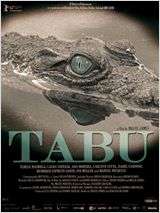 ......
...... .....
.....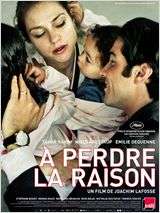 .....
.....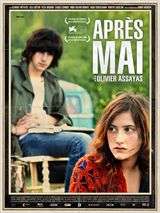 ....
....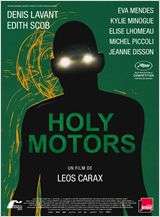
French posters for Tabu, Beyond the Hills, Our Children, Something in the Air, and Holy Morors
NOTE: The Film Society of Lincoln Center's offerings keep growing with the aid of the new Elinor Bunin Munroe Film Center across the street from the Walter Reade Theater, which houses two cinemas, an ampitheater and a café. Reviewing each Main Slate film in detail kept me from thoroughly covering the many sidebar items, though I was impressed by Shivendra Singh Dungarpur’s exhaustive and lovingly assembled documentary, Celluloid Man, which profiles P.K. Nair, the founder and longtime guiding spirit of the National Film Archive of India, who has been compared to the legendary Henri Langlois of the Paris Cinéthèque. For students of Indian film or of film in general this is a must-see. Other sidebar films of the NYFF shown to the press and recommended to me included some strong new documentaries. Philippe Béziat's Becoming Traviata follows the production of the opera in Aix-en-Provence. Francesco Patierno’s The War of the Volcanoes, is about rival film productions on the island of Stronboli by Rossellini with Ingrid Bergman and his ex-lover Anna Magnani. Liv and Ingmar (Dheeraj Akolkar) follows another turbulent film relationship. Curfew, in Program 2 of the Shorts program, is about babysitting. There was also a Masterworks series that included Laurence of Arabia and [i]Snow White and the Seven Dwarfs. Included (which I did see) was Charlie Is My Darling, a 65-min. documentary painstakingly reedited by Mick Gochanour and Robin Klein (who did The Rolling Stones Rock and Roll Circus ) of footage shot in 1965 of the Rolling Stones touring Ireland. It shows the Stones just beginning to be super-famous and includes what is said to be the first performance before an audience of "Satisfaction." Interesting discussion of this film by Richard Brody in his New Yorker movie blog. And as in earlier years there was the NYFF sidebar series Views from the Avant-Garde.
[CHRIS KNIPP]
Last edited by Chris Knipp; 07-23-2014 at 11:25 PM.
 Posting Permissions
Posting Permissions
- You may not post new threads
- You may not post replies
- You may not post attachments
- You may not edit your posts
-
Forum Rules





 Reply With Quote
Reply With Quote
 ]
]









 ......
...... .....
..... .....
..... ....
....

Bookmarks